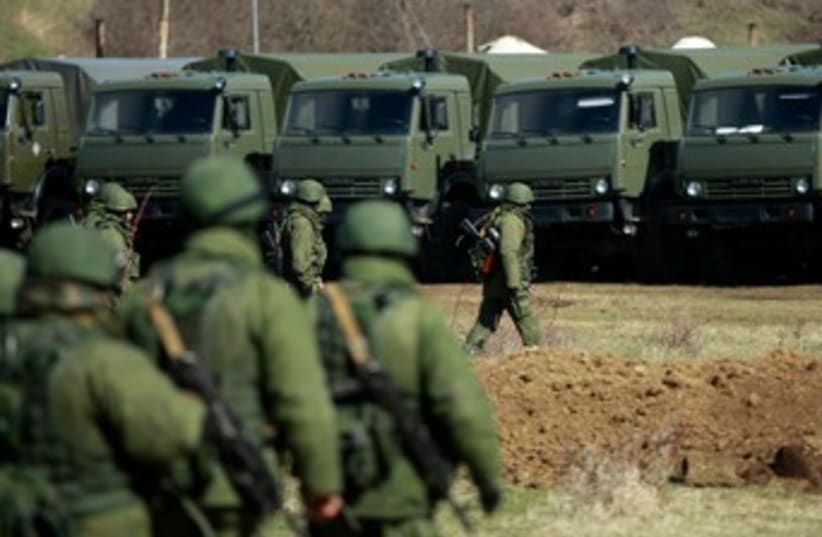KIEV - Ukrainian authorities carried out an inspection tour of Kiev's bomb shelters on Friday as lawmakers accused Russia of fomenting trouble in the Ukrainian capital after having annexed the Black Sea region of Crimea.
The new leadership seemed on edge after a far-right radical group that played a central role in the revolt that overthrew president Viktor Yanukovich rallied angrily outside parliament, demanding the dismissal of interior minister Arsen Avakov.
"They (the Russians) did not manage to ignite the flame of separatism in our regions," said acting president Oleksander Turchinov. "So now there are attempts to destabilize the situation in the heart of Ukraine, in Kiev."
In an unusual step that added to a climate of apprehension, Kiev authorities announced they had carried out checks on more than 500 urban bomb shelters in the capital to ensure they were in good working order, and were working on a new early warning system for the population of the former Soviet republic."We have 526 defense installations (shelters) in Kiev ... Today the city authorities are working to ensure that they are in appropriate technical condition to be able to guarantee the protection of people," Volodymyr Bondarenko, head of the capital's administration, said in a statement.
Tens of thousands of Russian troops thought to be massed on the border have shown no immediate sign of entering other parts of Ukraine, and President Vladimir Putin has said Moscow has no designs on other parts of its smaller neighbor.US President Barack Obama spoke on Friday regarding Russia's troop buildup on the Ukrainian border, saying that it was out of the ordinary and called on Moscow to pull its military back and begin talks to defuse tensions.
"You've seen a range of troops massing along that border under the guise of military exercises," he told CBS "This Morning" in an interview in Vatican City. "But these are not what Russia would normally be doing." Obama said the moves might be no more than an effort to intimidate Ukraine, but also could be a precursor to other actions."It may be that they've got additional plans," said Obama.While the tens of thousands of Russian troops thought to be massed on the border show no immediate sign of entering other parts of Ukraine, Russia has already flexed its trade muscles to upset the Western-backed Ukrainian recovery plan.
Russia is expected to use every weapon in its employ every weapon in its economic arsenal to ensure its neighbor's road to financial recovery is as painful as possible, even when paved with billions of dollars in Western aid.
Russia has "the right to use selective protective measures against Ukraine if it creates a free trade zone with a third government, or for example with the European Union," a Russian economy ministry spokesman said in response to a question from Reuters, citing the terms of a 2011 agreement.
He gave no details of what the measures might entail.
After months of anti-government protests and the overthrow of a government blighted by corruption and economic mismanagement, Ukraine is on the brink of bankruptcy, running wide external deficits and a current account shortfall of over 9 percent of gross domestic product.
On Thursday, the International Monetary Fund threw a financial lifeline, agreeing to stump up $14-18 billion as part of a two-year bailout package in exchange for tough economic reforms.
The deal, combined with Kiev's signing of a cooperation pact linked to closer trade ties with the European Union, represents a serious blow to Russian President Vladimir Putin's dream of Ukraine joining a Eurasian Union of former Soviet states.
Moscow will not make it easy and Ukraine is already feeling some consequences from its break with Russia.
Prime Minister Arseny Yatseniuk said on Wednesday the price the country would pay for Russian gas, which accounts for over half of Ukrainian gas imports, would soar by almost 80 percent from April 1 as the seizure of Crimea had rendered a cheaper gas deal obsolete.
Russia's Gazprom has suggested a new conflict over gas payments and supplies - like disputes in 2006 and 2009 that halted supplies to Ukraine and onward to Europe - could break out, though it added it had no interest in a resumption of such disputes.
"The better off Ukraine is under the new government, the more likely it will integrate into the West," said Nicu Popescu, senior analyst at the EU Institute for Security Studies (EUISS).
"So disrupting the Ukrainian transition in political and economic terms is probably Russia's primary foreign policy goal in the foreseeable future."
Putin's annexation of Crimea, which Kiev and the West say is illegitimate, is likely to push Ukraine's gross domestic product (GDP) down by 5 percent in 2014, according to Simon Mandel, Vice President for Emerging Europe at New York-based brokerage Auerbach Grayson.
